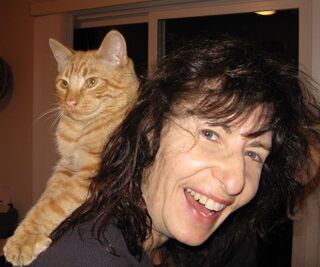Relationships
What Cats Can Teach Us About Love
A Personal Perspective: Loving and losing a cherished companion.
Posted December 10, 2021 Reviewed by Lybi Ma
Key points
- Cats have an uncanny ability to receive, and they can offer us less complicated relationships.
- We can learn from cats to live more in the present moment, forgive, and let go of small annoyances.

Friends of mine recently lost their adored cat due to kidney disease. Their heartbreak reminded me of my own sorrow after losing my own beloved cat many years ago. It made me wonder anew: What is it about cats that captures our heart and hurls us into grief when we lose them? Even as they leave a legacy of scratched furniture, rug stains, and disrupted sleep, our temporary annoyance is surpassed by an enduring affection and connection—and a heart full of grief when they pass.
For some people, bonding with a cat happens with greater delight than bonding with our fellow humans. This may seem odd to those who have never experienced a cat as a family member. But as we discover what helps us bond with an irresistible feline, we might better understand the ease of connection, and discover what might help us become a more loving human being.
The Art of Receiving and Letting Go
As I explored in a previous article, cats (dogs too!) have a capacity to receive, which softens our heart and delights our soul. If we were fortunate to have a cat who is especially affectionate and not too traumatized as a kitten, we may sense a trust and openness that invites us toward them, allowing our defenses to melt and our heart to open. Even as we may sometimes ignore their bids for attention, delay feeding them, or display occasional annoyance, our friendly feline has the resilience to forgive and move on. They’re not acquainted with the human capacity to hold a grudge.
When we pet a cat who enters a purr-fect altered state, our defenses soften and our heart opens. We get an immune system boost. We may feel that what we’re offering is being received with openness and perhaps something that resembles gratitude. We feel that we make a difference in our cat’s well-being. There’s a connection that grows and deepens.
Cats are adept at living in the present moment. The science-minded among us might reduce this to how their brains operate differently. And while true, that our “advanced” neocortex stores memories and makes calculations that cats are not capable of, there is something about how they’re wired that we might learn from.
As partners become familiar with each other, there are inevitably difficult and unpleasant experiences that get lodged in our memory banks. When we break trust with a cat, such as not feeding them on their accustomed schedule, they might sulk—or pee on the rug—but then they’ve over it. Humans tend to mentally chew on things. We formulate opinions and judgments about the person who “wronged” or insulted us. We might sink into a tailspin of shame. We may tap our defense mechanisms to protect ourselves from possible future violations. We become cool, distant, and store grievances; we're reluctant to return to a simple openness that would once again welcome our partner back into our hearts.
Lest this sound simplistic, let me add that human relationships are decidedly more complex than a relationship with a pet. If we’re been betrayed in some serious way, such as through an affair, it’s helpful to have a wise brain that can evaluate the situation, honor our feelings and needs for safety, process our hurt, and clarity what we need to trust again.
Many annoyances that arise in our relationships are about the small stuff. If our partner is late, tells a bad joke, or misplaces our favorite cutting knife, we might be annoyed in the moment. But how long do we hold onto our resentment or hurt? To let go, we may need to process our feelings with our partner. But if we feel compelled to process every small annoyance, we leave little room to relish the relationship, as we might do more easily with our furry friend.
To let go of small annoyances, we need to connect with ourselves deeply, resource ourselves and find the resilience to return to the present moment. For humans, this requires a certain amount of work, which a cat is not troubled with; they live in the present.
One thing we might learn from our treasured feline is to keep renewing ourselves by returning to the present moment—relishing the Power of Now, as author Echart Tolle puts it. We can be with our feelings in a gentle way, which enables them to pass, enabling us to forgive and move on. Like humans, some cats are more accessible than others. But if you’ve lived with one who is adept at receiving and giving affection, who delights you with spontaneous antics that brings a smile to your face, and who charms you with their hypnotic purring and cuddly presence, then you’ve been blessed with a connection that is irreplaceable.
As we remember that life is change and that all good things pass, we can also remember that, as C.S. Lewis beautifully put it in his book, A Grief Observed (and depicted in the movie, Shadowlands), “The pain I feel now is the happiness I had before. That's the deal.”
As my friends who lost their cat express it:
"We received the blessing of his life and were, ultimately, powerless to prevent his death. The blessing and the loss are tied together. He taught us so much about love and attachment. We always tried to make life as good as possible for him, and we realize that we never could have given as much as we received."
To live fully is to love fully, whether with our partner, friends, family—or cherished four-legged companion. And when we experience inevitable loss, perhaps we can find some comfort knowing that the depth of our loss equates to the love that has lived—and continues to live—in our hearts.
To anyone who has lost a beloved pet: You loved them dearly and they loved you. Perhaps they taught you how to love and be loved. May this love continue to live in your hearts and shine into a world that also needs your love.
© John Amodeo




